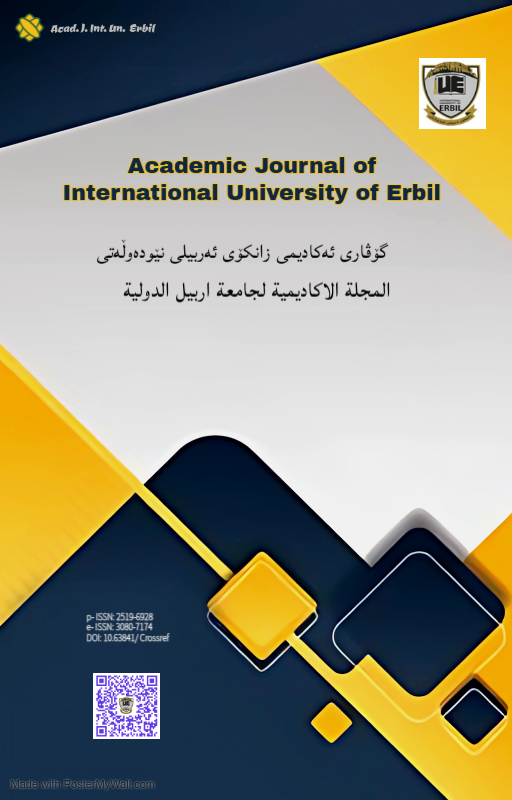Factors Influencing Internal Audit Effectiveness: An Analytical Study in the Public Sector of Erbil
DOI:
https://doi.org/10.63841/iue21575Keywords:
Internal Audit Effectiveness, Public Sector Auditing, Management Support, Auditor Development, ErbilAbstract
This study investigates the factors influencing internal audit effectiveness within the public sector of Erbil. The primary focus is on management support, organizational settings, and auditor development, all of which are considered critical for improving audit quality. A quantitative research design was employed, using a structured questionnaire distributed to internal auditors and management personnel in public organizations across Erbil. The results, analyzed through Exploratory Factor Analysis (EFA), revealed five key factors impacting audit effectiveness: auditor development and technology, managerial support and guidance, managerial decision-making, auditor autonomy, and internal audit policies. Notably, management support emerged as the most significant determinant of effective audits. These findings highlight the importance of fostering an environment of managerial engagement, professional development, and auditor independence to enhance transparency and governance in the public sector. The study contributes valuable insights for policymakers seeking to improve audit practices in developing regions and suggests areas for future research, including expanding the scope to other regions and exploring the role of technology in audit processes.
References
Abbood, S. K., & Maaeni, S. S. A. (2022). The impact of Added Value of Internal Audit in the Transparency and Accountability: An Applied research in a sample of the Ministry of Water Resources companies in Iraq. Studies of Applied Economics, 40(3). https://doi.org/10.25115/EEA.V40I3.6346
Al-Frijat, Y. S. (2020). Compliance with Continuing Professional Development (IES7) of Internal Auditor and Quality of Internal Audit Function. Accounting and Finance Research, 9(1), 28. https://doi.org/10.5430/AFR.V9N1P28
Alqaraleh, M. H., Almari, M. O. S., Ali, B. J. A., & Oudat, M. S. (2022). The mediating role of organizational culture on the relationship between information technology and internal audit effectiveness. Corporate Governance and Organizational Behavior Review, 6(1), 8–18. https://doi.org/10.22495/CGOBRV6I1P1
Drees, J. M., & Heugens, P. P. M. A. R. (2012). Synthesizing and Extending Resource Dependence Theory. Journal of Management, 39(6), 1666–1698. https://doi.org/10.1177/0149206312471391
Hackenbrack, K., & Knechel, W. R. (1997). Resource Allocation Decisions in Audit Engagements. Contemporary Accounting Research, 14(3), 481–499. https://doi.org/10.1111/J.1911-3846.1997.TB00537.X
Hermawan, A., & Bustomi, A. (2022). Impact of internal audit competence and objectivity on quality audit results. JPPI (Jurnal Penelitian Pendidikan Indonesia), 8(1), 170. https://doi.org/10.29210/020221298
Kamal, C. N. P. (2023). Auditor Independence And Its Influence On Accounting Behavior: A Systematic Literature Review. Journal Integration of Management Studies, 1(2). https://doi.org/10.58229/JIMS.V1I2.133
KARELI, A., SKITSOU, A., & CHARALAMBOUS, G. (2022). The Impact of Internal Audit on Public Administration. Health Review, 33(186), 7–13. https://doi.org/10.54042/HR617HHSMA
Kas’yanova, S., Saliy, V., Sharudina, Z., Madatova, O., & Kucegreeva, L. (2023). Methodological aspects of the evaluation of the internal control system of the organization. Methodological Aspects of the Evaluation of the Internal Control System of the Organization. https://doi.org/10.12737/1907644
Kusumawati, M. P., Rahman, A. N., & Rahman, P. A. (2022). The Phenomenon oOf Internal Audit Supervision in Fighting Corruption and Creating an Anti-Fraud Culture in Corporations in Indonesia. Asia Pacific Fraud Journal, 7(2), 129. https://doi.org/10.21532/APFJOURNAL.V7I2.246
Larasdiputra, G. D., & Martini, N. (2020). Analysis Of The Effect Of Competency On Audit Quality. https://doi.org/10.38142/IJESSS.V1I3.42
Liston-Heyes, C., & Juillet, L. (2023). Does increasing auditors’ independence lead to more forceful public auditing? A study of a Canadian internal audit reform. Public Administration. https://doi.org/10.1111/PADM.12964
Mwanza, O., & Kaira, B. (2022). THE EFFECTIVENESS OF INTERNAL AUDITING IN THE PUBLIC SECTOR IN ZAMBIA. Journal of Accountancy, 5(1), 13–33. https://doi.org/10.47941/JACC.924
Nedyalkova, P. (2019). Evaluation as a Means of Assessing the Quality, Effectiveness and Efficiency of Internal Audit. Contributions to Management Science, 47–57. https://doi.org/10.1007/978-3-030-29329-1_5
Patricia, V. L. T. (2022). The Role of Internal Auditors in Supporting the Implementation of the Principles of Transparency and Accountability (Study at PT. Bank Mega Syariah KC. MEDAN). Journal of Indonesian Management (JIM), 2(1). https://doi.org/10.53697/JIM.V2I1.458
Rida, Sari, Sri, Hastuti, Dyah, Ratnawati, Munari, M., & Rika. (2020). The Quality Of Audit Results In Public Sector. https://doi.org/10.4108/EAI.3-10-2019.2291932
Roussy, M., Barbe, O., & Raimbault, S. (2020). Internal audit: from effectiveness to organizational significance. Managerial Auditing Journal, 35(2), 322–342. https://doi.org/10.1108/MAJ-01-2019-2162
Setiawan, N., Rohemah, R., & Aulia, I. F. (2023). Independence for Internal Auditors: Is it Necessary? Jurnal Riset Akuntansi Dan Auditing, 10(2), 25–34. https://doi.org/10.55963/JRAA.V10I2.542
Shuwaili, A. M. J., Hesarzadeh, R., & Bagherpour Velashani, M. A. (2023). Designing an internal audit effectiveness model for public sector: qualitative and quantitative evidence from a developing country. Journal of Facilities Management. https://doi.org/10.1108/JFM-07-2022-0077
Străpuc, C. (2023). Internal public audit in the local public administration in Romania - retrospective and perspective. International Scientific Conference on Accounting ISCA 2023, 234–247. https://doi.org/10.53486/ISCA2023.29
Ta, T. T., & Doan, T. N. (2022). Factors Affecting Internal Audit Effectiveness: Empirical Evidence from Vietnam. International Journal of Financial Studies, 10(2). https://doi.org/10.3390/IJFS10020037
Widyanah, W. (2020). The Influence of Auditor Professionalism and Auditor’s Competency on Audit Quality. JASa (Jurnal Akuntansi Audit Dan Sistem Informasi Akuntansi), 4(3), 460–464. https://doi.org/10.36555/JASA.V4I3.1500
Yakubu, R., & Williams, T. (2020). A theoretical approach to auditor independence and audit quality. Corporate Ownership and Control, 17(2), 124–141. https://doi.org/10.22495/COCV17I2ART11
Yanti, D. (2022). Management Support, Competence, Organizational Culture and Professional Ethics on Internal Audit Effectiveness. International Journal of Multidisciplinary Research and Analysis, 05(04). https://doi.org/10.47191/IJMRA/V5-I4-12
Zemtsov, T. A., & Sorokin, M. A. (2022). Risk assessment in risk-oriented audits by internal audit units. Vestnik Tomskogo Gosudarstvennogo Universiteta. Ekonomika, 57, 129–144. https://doi.org/10.17223/19988648/57/9
Zhang, J., & Huang, X. (2023). Investigation on the Application of Cost Management in Operational Efficiency and Performance Evaluation. Manufacturing & Service Operations Management, 4(5), 12–20. https://doi.org/10.23977/MSOM.2023.040502 [7] T. Murphy, "Evaluate open-source risks," http://www. ftponline. com/wss/2002_10/online/tmurphy/, retrieved, vol. 19, p. 2012, 2001.
Downloads
Published
Issue
Section
License
Copyright (c) 2025 Academic Journal of International University of Erbil

This work is licensed under a Creative Commons Attribution 4.0 International License.












